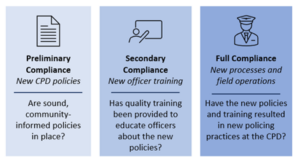Why is Chicago under a Consent Decree?
- December 2015 – U.S. Attorney General launched a civil rights investigation into the CPD’s policing practices.
- January 2017 – The U.S. Department of Justice released the results of its investigation and found a longstanding, pervasive “pattern or practice” of civil rights abuses by the CPD.[1]
- August 2017 – Office of the Illinois Attorney General sued the City of Chicago seeking a Consent Decree to address DOJ’s findings and recommendations. The case was assigned to federal Judge Robert M. Dow, Jr. The OAG sought input from community members and Chicago police officers and negotiated the Consent Decree with the City.
- March 2018 – The Parties to the Consent Decree, the OAG, and the City entered into a Memorandum of Understanding with community organizations known as the Coalition in the Consent Decree.[2]
- July 2018 – The OAG and the City released a draft of the Consent Decree [3] and sought proposals for an Independent Monitoring Team.
- October 2018 – Judge Dow received public feedback on the proposed Consent Decree through written comments and two days of public fairness hearings.
- January 31, 2019 – Judge Dow approved and signed the Consent Decree.
- March 1, 2019, Consent Decree went into effect. Judge Dow appointed Maggie Hickey as the Independent Monitor and appointed Judge David H. Coar, Ret. as a special master to “help facilitate dialogue and assist the OAG, the City, and other stakeholders in resolving issues that could delay implementation of the Consent Decree.” Both Independent Monitor Hickey and special master Judge Coar report directly to Judge Dow.
- October 11, 2022. Chief US District Judge of the District Court for the Northern District of Illinois Rebecca R. Pallmeyer became the presiding judge over the Consent Decree.
[1] DOJ Civil Rights Division and United States Attorney’s Office Northern District of Illinois, Investigation of Chicago Police Department (January 13, 2017) at 4, available here.
[2] See Memorandum of Agreement Between the Office of the Illinois Attorney General and the City of Chicago and Campbell v. City of Chicago Plaintiffs and Communities United v. City of Chicago Plaintiffs (March 20, 2018), available here.
[3] More information about the IMT selection process is available on this website, which the OAG administers. See Independent Monitor, Chicago Police Consent Decree, http://chicagopoliceconsentdecree.org/independent-monitor/. Other resources, such as Consent Decree documents, court filings, and reports, are also available on this website. See Resources, Chicago Police Consent Decree, http://chicagopoliceconsentdecree.org/resources/.
What is the Independent Monitoring Team?
The Independent Monitoring Team (IMT) assesses the City’s progress toward complying with the requirements of the Consent Decree. Independent Monitor, Maggie Hickey leads a team of professionals and consultants from ArentFox Schiff, a law firm in Chicago, and the CNA Center for Justice Research and Innovation that includes recognized leaders and innovators in police reform. The IMT members have experience as police chiefs, academic scholars, data analysts, and attorneys who have a wide range of expertise in every aspect of the Consent Decree. Their role is to assess the CPD’s and the City’s compliance with the required reforms of the Consent Decree. Meet the team.
What does the Independent Monitoring Team do?
- Reports to Judge Pallmeyer
- Reviews planned changes in CPD protocols, procedures, processes, and practices
- Observes police training and police work in the field
- Engages in outreach to understand how changes to policing are felt in communities
- Provides input to shape new and revised policy
- Determines the City’s compliance with the Consent Decree
- Issues public reports on this website.
How does the Independent Monitoring Team do its work?
- Attends Community Organization Meetings In-Person or Virtual
- Hosts Meetings with Community Organizations and Community Members
- Attends the CPD’s Community Meetings Known as the CAPS Beat Meetings
- Attends District Advisory Committee Meetings
- Co-Hosts Quarterly Meetings with Coalition
- Reviews CPD and City Policies and Training
- Observes CPD and City Training
- Observes CPD Internal Progress Updates
- Ensures Meaningful Data Transparency
- Communicates often with the CPD and the City to understand progress
- Provides Ongoing Technical Assistance
- Conducts On-Site Visits to see reforms in person
- Hosts Community Outreach Meetings
- Hosts Listening Sessions for Significant Events like the Demonstrations in the Summer of 2020
- Creates Annual Monitoring Plans
- Creates Semi-Annual Reports on Consent Decree Progress
- Creates Special Reports on Significant Events like the Demonstrations in the Summer of 2020
- Conducts Bi-Annual Community Surveys
- Conducts Focus Groups of Underrepresented Populations
How does the Independent Monitoring Team determine compliance?

The IMT assesses how the City, the CPD, and other City entities comply with each paragraph of the Consent Decree in three successive levels: (1) Preliminary compliance, (2) Secondary compliance, and (3) Full compliance. The CPD and other City entities will not be “in compliance” with a requirement until they reach Full compliance for the requisite length of time required by the Consent Decree—either one or two years. See ¶714.
What is the Independent Monitor’s Community Engagement Team?
One of the strengths of Independent Monitor Hickey’s approach is the IMT’s Community Engagement Team. The IMT’s Community Engagement Team performs two key tasks regarding the Consent Decree monitoring process: (1) gathering input from Chicagoans about their concerns regarding CPD policies and practices, and (2) providing in-formation to the Chicago community about the IMT’s activities and findings.
We organize in-person and virtual meetings to engage Chicago’s communities in the reform process. This local team of passionate experts meets frequently with residents, stakeholders, and activists to ensure the community has a voice in this process.
